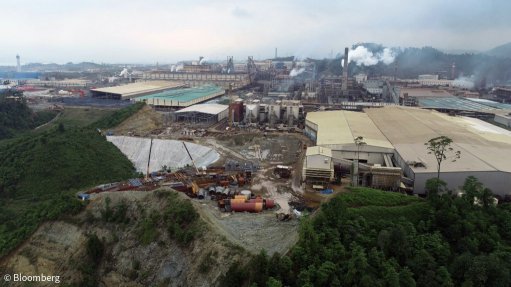Report calls on G20 governments to immediately phase out fossil fuel subsidies
TORONTO (miningweekly.com) – Despite efforts to boost so-called green economies, the Group of Twenty (G20) international governments provided $452-billion a year in subsidies to produce fossil fuels in 2013 and 2014, a new report has shown.
That was almost four times the amount that the International Energy Agency had estimated was provided in all global subsidies to renewables in 2013.
Nongovernmental organisation (NGO) Oil Change International argued that the continued support for fossil fuel production married bad economics with potentially disastrous consequences for the climate.
“It is tantamount to G20 governments allowing fossil fuel producers to undermine national climate commitments, while paying them for the privilege,” authors of the report ‘Empty promises: G20 subsidies to oil, gas and coal production’ stated.
In effect, governments were propping up the oil, gas and coal industries despite pledging, in 2009, to phase out "inefficient" fossil fuel subsidies. The report pointed to a large gap between G20 commitments and action.
The report advised that Russia had significant national subsidies for fossil fuel production of almost $23-billion a year. The US provided more than $20-billion in national fossil fuel production subsidies each year, despite calls from President Barack Obama to eliminate industry tax breaks.
According to the report, which was released on Thursday, the UK also continued to encourage offshore oil and gas in the North Sea, resulting in national subsidies to fossil fuel production of about $9-billion a year in 2013 and 2014. This was despite recent pledges by the UK government in support of the Friends of Fossil Fuel Subsidy Reform, the NGO noted.
The UK was also one of the few G20 countries that was increasing its fossil fuel subsidies, while cutting back on support for the renewable-energy investments that are needed to support a low-carbon transition, the report found.
Australia and Brazil provided national subsidies of $5-billion a year, on average, including for the development of fossil fuel resources in increasingly remote and challenging areas inland and offshore.
China provided national subsidies of just more than $3-billion a year, on average, in 2013 and 2014, including grants for coal producers and support to research and development for fossil fuel production, including for carbon capture and storage.
In his election platform, Canadian Prime Minister Justin Trudeau pledged that his government would end fossil fuel subsidies.
The report documented, for the first time, the scale and structure of fossil fuel production subsidies in the G20 countries. The evidence pointed to a publicly financed bailout for some of the world’s largest, most carbon-intensive and polluting companies.
Researchers had based the report on three types of fossil fuel production subsidies. These included national subsidies delivered through direct spending and tax breaks of $78-billion; investments by majority State-owned enterprises (SOEs) that account for another $286-billion; and public finance from majority government-owned banks and financial institutions that amounted to another $88-billion a year on average in 2013 and 2014.
RECOMMENDATIONS
The report set out five recommendations to ensure that G20 governments, in particular, kept their promises.
Oil Change would like to see governments eliminate all subsidies to exploration and coal by 2020 and adopt strict timelines to phase out fossil fuel subsidies and remaining subsidies to consumption, with country-specific and measurable outcomes.
It suggested that governments increase transparency through a publicly disclosed, consistent reporting scheme for all national subsidies for fossil fuels, strengthening the existing inventory created by the 34-country Organisation for Economic Cooperation and Development (OECD) and expanding it to include all countries, using the OECD’s existing model for tracking agricultural subsidies.
The NGO further advised administrations to increase the transparency of reporting on investment in and finance for fossil fuels by SOEs and the majority publicly owned financial institutions.
The report also advocated closer relations with international institutions and processes, such as the G20 and Asia-Pacific Economic Cooperation, the OECD, the United Nations Framework Convention on Climate Change and the Sustainable Development Goals to eliminate any incentives for fossil fuel production and to monitor reforms so that no new incentives were established.
Oil Change recommended that subsidies be shifted from fossil fuel production to support wider public goods, including through support for the transition to low-carbon energy systems and universal energy access.
The NGO was driving a campaign to demand world leaders #StopFundingFossils on November 14.
Meanwhile, the province of Ontario announced on Thursday that it would increase its fuel subsidies to 95 municipalities by $11.4-million to $332.9-million, to help expand and improve public transit. Since 2004, Ontario had allocated more than $3.4-billion in gas tax funding to communities across the province.
Ontario shared C$0.02/ℓ of provincial fuel tax revenues with municipalities to expand and improve public transit.
Trudeau would be making his first international trip as Prime Minister of Canada to the G20 summit in Antalya, Turkey, from November 15 and 16, and to the Asia-Pacific Economic Cooperation Leaders’ Meeting in Manila, Philippines, between November 18 and 19.
At the G20 Summit, Trudeau would participate in discussions on the global economy and on creating growth, stimulating job creation and ensuring shared prosperity. Other areas of focus would include trade, financial regulation, international tax issues, anticorruption efforts, energy, development, action against climate change, as well as the refugee crisis.
Comments
Press Office
Announcements
What's On
Subscribe to improve your user experience...
Option 1 (equivalent of R125 a month):
Receive a weekly copy of Creamer Media's Engineering News & Mining Weekly magazine
(print copy for those in South Africa and e-magazine for those outside of South Africa)
Receive daily email newsletters
Access to full search results
Access archive of magazine back copies
Access to Projects in Progress
Access to ONE Research Report of your choice in PDF format
Option 2 (equivalent of R375 a month):
All benefits from Option 1
PLUS
Access to Creamer Media's Research Channel Africa for ALL Research Reports, in PDF format, on various industrial and mining sectors
including Electricity; Water; Energy Transition; Hydrogen; Roads, Rail and Ports; Coal; Gold; Platinum; Battery Metals; etc.
Already a subscriber?
Forgotten your password?
Receive weekly copy of Creamer Media's Engineering News & Mining Weekly magazine (print copy for those in South Africa and e-magazine for those outside of South Africa)
➕
Recieve daily email newsletters
➕
Access to full search results
➕
Access archive of magazine back copies
➕
Access to Projects in Progress
➕
Access to ONE Research Report of your choice in PDF format
RESEARCH CHANNEL AFRICA
R4500 (equivalent of R375 a month)
SUBSCRIBEAll benefits from Option 1
➕
Access to Creamer Media's Research Channel Africa for ALL Research Reports on various industrial and mining sectors, in PDF format, including on:
Electricity
➕
Water
➕
Energy Transition
➕
Hydrogen
➕
Roads, Rail and Ports
➕
Coal
➕
Gold
➕
Platinum
➕
Battery Metals
➕
etc.
Receive all benefits from Option 1 or Option 2 delivered to numerous people at your company
➕
Multiple User names and Passwords for simultaneous log-ins
➕
Intranet integration access to all in your organisation





















